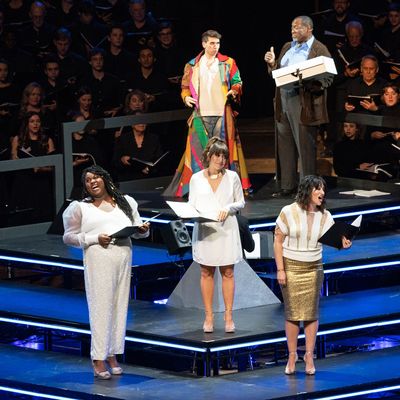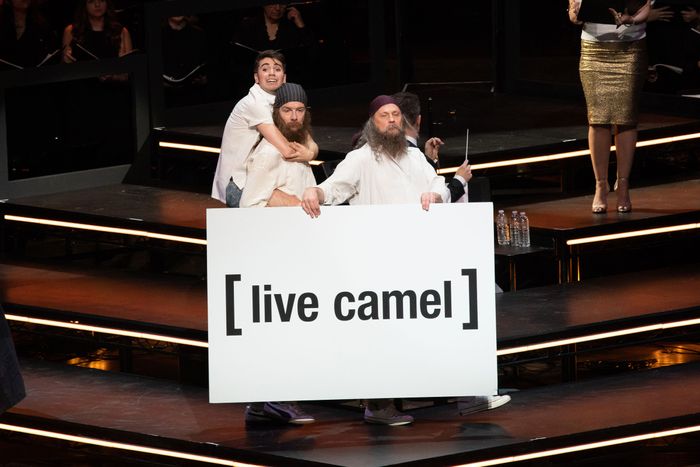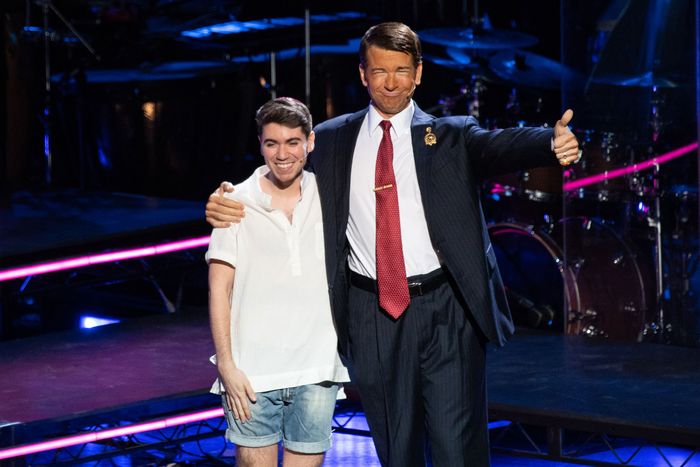
Way, way back, many centuries ago … on Monday night at Lincoln Center’s David Geffen Hall, a truly and delightfully chaotic cast of Broadway singers took the stage for a one-night-only concert of Andrew Lloyd Webber’s Joseph and the Amazing Technicolor Dreamcoat. It was fun. It was messy. It blew my beloved direct-to-VHS version starring Donny Osmond out of the water.
In case you’re not familiar with the show — a period piece twice over, from the Book of Genesis and then again from 1968 — it tells the biblical story of Joseph, a young man from Canaan who is sold into slavery by his 11 jealous brothers. They covet the multicolored coat Joseph’s father, Jacob, gives his favorite son, setting off a chain of events that lead to Joseph’s becoming the pharaoh’s right-hand man. And did I mention that Joseph can read dreams? The show is a big ol’ Bible-study thing and, anecdotally, is one of the few joys you get as a musical-theater nerd who spends a decade going to Catholic school in a plaid skort and knee socks and forced to sing “make me a channel of your peace” five days a week before class. (The other is, of course, Jesus Christ Superstar, but that’s only if your music teacher is progressive and okay with the whole Mary’s been unfairly characterized as a slut bit.)
The show’s narrator role, singing us through Joseph’s journey, was split among three performers: Jessica Vosk, Eden Espinosa, and Alex Newell. (Two former Elphabas and a late-stage Glee cast member who most recently starred in Once on This Island, respectively.) As any good theater kid will tell you, divvying up the narrator is a common tactic to stretch a show with a small cast a little further, and also to keep Brittany, Brooke, and Amanda from killing each other over who gets the part, thus dividing the entire cast into warring factions that will feud until the end of summer when all will be forgotten because the world is ending and [sobs] we will never forget how much this show means to us. Despite his usual standout voice, Newell was noticeably the weakest of the three, repeatedly flubbing lines. Vosk’s Act II opener, “A Pharaoh’s Story,” was a real (and literal) high point.
Joseph’s title role was played by Dear Evan Hansen alumnus Noah Galvin — the Tony-winning originator of that title role, Ben Platt, was also in the audience on this particular evening — who took the stage wearing a purple kippah, white tunic, and a pair of cuffed denim shorts which I am pretty sure earned him the title of most the thigh-forward Joseph in theater history. (He was a replacement for The Band’s Visit’s Ari’el Stachel, who pulled out in December.) According to Vosk (who took over Vulture’s Instagram Stories account on the day of the show), Galvin was on vocal rest leading up to the performance. It worked. Galvin’s voice rang clear and healthy. (Sound balance, however, was a problem all evening; the orchestra and the chorus, composed of adults and kids from choirs around the country, often drowned out the cast.) There’s a very important option up toward the end of the emotional Act I ballad, “Close Every Door,” which Joseph sings from a prison cell into which he’s been unjustly tossed. (“For I know I SHALL FIND, my own piece of my-eye-nd!” If you know, you know.) Galvin absolutely nailed it. After which the chorus held up placards bearing names like “Malala” and “Harvey” and “Colin” and “Gandhi” and “Rosa” and “Greta,” in an attempt to signal solidarity with something nonspecific. It didn’t really land, partly because — my apologies to Mr. Milk — the name Harvey could really use some better PR these days.
What did land, however, was another giant placard reading LIVE CAMEL carried across stage by two men in lieu of the actual animal. (Ditto one reading LIVE GOAT and later flipped over to reveal a blood-splattered DEAD GOAT.) Galvin climbed aboard one of their backs as though riding it. He’s on said camel because his brothers, out of spite, have just sold him to some passing Ishmaelites. One of these brothers, the beret-clad Gad, played by Bonnie Milligan, will come to lament this in the second act. That number, “Those Canaan Days,” received the loudest applause of the night. The only thing Milligan — who starred in 2018’s Head Over Heels — committed harder to than her big, belty high notes was her French accent. Considering a revival of Beauty and the Beast? Milligan for Lumiere. Les Mis? Let her play every fucking part, and YES I know that in 2020 we still let players telling the story of the French Revolution do British accents to signify they’re European, but Milligan will be doing French because that’s how good she is. (“Bonnie,” Vosk said in faux annoyance, breaking character to usher Milligan back into line with the rest of the brothers’ chorus in an attempt to get the crowd to stop cheering.) Mykal Kilgore — he too has ample Broadway credits, but please just go listen to him doing “King of the World” from City Center’s 2018 production of Songs for a New World, a performance that stole the breath right out my body — riffing his way through “Benjamin Calypso” was also a treat.
Can you believe I haven’t even mentioned the part where Potiphar, the captain of Pharaoh’s guard who initially purchases Joseph as a slave, was played by orange-faced Andy Karl (Groundhog Day, Pretty Woman) doing a Trump impersonation in a blue suit and red tie. “Make Egypt great again,” he quipped. His real-life wife, Orfeh (Legally Blonde, Pretty Woman), played his spouse onstage, though she opted out of any Melania impressions. Here’s where I gift you the mental image of Orfeh trying to seduce Noah Galvin, specifically by placing his head between her breasts.
I also forgot to mention The Prom’s Brooks Ashmanskas as a doomed baker and SpongeBob SquarePants’s Gavin Lee — you may remember his tap-dancing Squidward — as a less-doomed butler. Joseph meets them both in jail and tells them what their dreams mean before he does the same for the pharaoh, played by Merle Dandridge (Once on This Island) as the love child of Tina Turner and Beyoncé. During her reprise, Lee pulled out a leaf blower to give Dandridge, clad in a gold bodysuit, the necessary wind-in-her-hair effect.
If, at this point, you are thinking that this show sounds insane, you’re correct. For some perspective, I must also remind you that Andrew Lloyd Weber also once wrote a musical about sentient singing trains on roller skates.
A thing about Joseph is that, after the happy ending, you get to watch the whole show again during a seven-minute encore as the cast sings snippets of every song again, rapid-fire, until their lungs give out. (A couple seated near me sprang up and hustled toward the exit after the first round of bows, not knowing what they were about to miss.). And so we, those in the audience who did not flee our seats, got to enjoy the iconic “Megamix” and every cast member once again returning for a moment in the spotlight to riff for the gods — or for the Father, Son, and Holy Spirit, if you want to be monotheistic about it.
The final song sampled is a return to the number where the cast chants the various colors of Joseph’s coat. When I did Joseph in high school, the cool kids refused to learn the words to this song and instead just sang “purple and purple and purple” ad nauseam in a bit that would make them howl with laughter and to this day makes me, a person who has never, not even once, been fun, extremely irritated. At Lincoln Center, there was no such nonsense. “It was red and yellow and green and brown and scarlet and black and ochre and peach and ruby and olive and violet and fawn and lilac and gold and chocolate and mauve and cream and crimson and silver and rose and azure and lemon and russet and gray and purple and white and pink and orange and blue.” A perfect mess of color for a perfect mess of a show.



